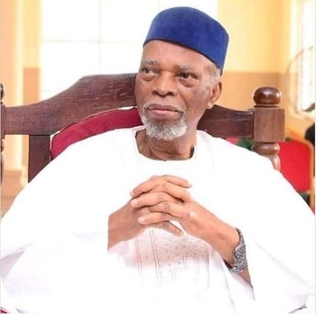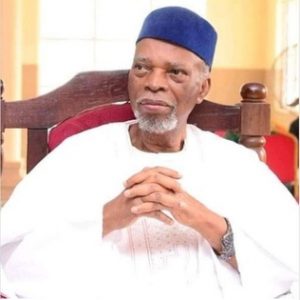Evangelist Bamidele Isola Olumilua
There are men who roar through history like thunder. And there are others, quieter, steadier, whose light endures not because they sought fame, but because they lived by values too enduring to be forgotten. Evangelist Bamidele Isola Olumilua was such a man. A statesman in an age of strongmen. A diplomat without guile. A governor without hubris. A servant-leader whose story was never about grabbing the headlines, but about holding the line of principle when others fled the trenches.
This is a tribute not just to the man he was, but to the life he led, and the path he cleared for a generation of believers in purposeful, ethical leadership.
Born in 1940 in the ancient town of Ikere-Ekiti, Bamidele Olumilua came into the world not with a silver spoon, but with a spirit forged in the crucible of faith and service. His early education at Christ Apostolic Church Primary School offered him more than literacy. It cultivated the discipline of a faith-filled life. He went on to further his education both in Nigeria and abroad, earning degrees in economics and law, and eventually joining Nigeria’s Foreign Service.
But titles were never his measure of worth. Even as a diplomat, his real currency was character. Stationed in Canada, he became known not just as a representative of the Nigerian state, but as a moral compass, engaging communities, resolving conflicts, and upholding the nation’s honour with quiet dignity.
Olumilua’s entry into politics was, by his own account, accidental. He was, by training and by temperament, a diplomat and a preacher. Yet history found him, and in answering its call, he shaped a generation of governance in the old Ondo State.
It is easy to forget that his time as governor, though brief from 1992 to 1993, remains a case study in how public service can be a noble calling when exercised with vision, restraint and a deep respect for the people.
He came into office at a time when Nigeria’s politics was in flux. Democracy was still fledgling. And expectations weighed heavily on elected officials.
Olumilua never flinched. He embraced the moment with calmness and tenacity. Within the constraints of the era, he governed with uncommon prudence and foresight, laying the groundwork for institutions and policies that would outlive his time in office.
Among his most notable achievements was securing recognition for Ondo State as an oil-producing region, which opened the door to its first-ever derivation payments. It was a milestone that many had considered beyond reach. Yet Olumilua’s approach was not to posture or to boast. He simply got the job done, often out of the spotlight, always for the greater good.
His establishment of the Ondo State Road Materials Company and the Environmental Protection Agency was equally indicative of his governing philosophy. He saw governance as problem-solving, less about grand visions and more about practical solutions to everyday challenges. His administration, limited in duration, nevertheless exuded a long-sightedness that is rarely seen in politics.
Yet perhaps what most distinguished Olumilua was not his policy acumen, but his personal integrity. In an era when the perks of office were seen as personal spoils, he remained above the fray. The story of his daughter being denied admission to study law due to a technical error, and his refusal to intervene, has become the stuff of moral legend. “I will not bend the rules for my own,” he said. How many leaders today would hold the line so firmly?
Before politics, Olumilua had already served Nigeria with distinction as a diplomat, representing the country in Addis Ababa, Netherlands, Canada, and USA. He carried himself with the decorum befitting such postings, yet never with airs. Colleagues recall a man who combined international polish with local humility. When he returned home, it was not to luxuriate in prestige but to sow into the soil of his people’s aspirations.
Faith was the compass by which he navigated life. As an evangelist, he was not performative. He lived his faith in quiet conviction. He prayed earnestly, believed deeply, and acted with spiritual purpose. One notable instance saw him rally prayer warriors for Chief Olu Falae’s presidential bid, not out of political self-interest, but out of belief in the cause. He blended the worlds of governance and spirituality without confusing their roles.
At home, he was both a disciplinarian and a nurturer. His children speak of “angle 90” punishments and strict moral codes, including double penalties for lying. Yet the love was never in doubt. In a polygamous household that defied the dysfunction of stereotype, he fostered unity, not rivalry. Family, for him, was both a mission and a ministry.
Olumilua’s political career was bookended by moments of deep national tension. He was removed from office following the Abacha coup of 1993, a disruption that halted many of his initiatives. Still, he carried no bitterness. Politics, for him, was a vehicle, not a destination. In the turbulent aftermath of the June 12 annulment, he advocated legal routes to justice. While others fanned the flames of chaos, Olumilua stood firm in his belief that legality and legitimacy were not mutually exclusive. Time vindicated his stance.
Throughout his life, Olumilua remained consistent in his values, even as others zigzagged for convenience and relevance. He was the rare leader who understood that compromise should never come at the cost of character. It is telling that years after his passing, his name still opens doors. Not because of wealth or influence, but because of what it represents: Integrity. Service. Principle.
He did not leave behind sprawling estates or tales of opulence. What he bequeathed was more profound: a name unsullied by scandal, a life unmarred by excesses. As his son Muyiwa has testified, the Olumilua name continues to inspire trust and admiration in circles high and low. It is a legacy rooted not in rhetoric but in the lived example of decency and discipline.
The upgrading of the College of Education, Ikere-Ekiti, to Bamidele Olumilua University of Education, Science and Technology, BOUEST, Ikere-Ekiti, in his honour was more than a symbolic gesture. It was a recognition of a life that educated by example. A reminder to future generations that there is dignity in quiet excellence and honour in public service. His story is not merely one of what he achieved, but of how he carried himself while doing so.
Olumilua did not see leadership as an opportunity for dominance but as a platform for stewardship. He believed that the truest measure of power is how it is used in the service of others. In a time when governance is often transactional, his life offers a refreshing counter-narrative: that values are not a weakness in politics but a source of enduring strength.
His memory lives not only in physical landmarks but in the hearts of those who encountered his grace. Those who sat under his leadership, those who broke bread with him, those who observed the harmony between his public life and private values; they all testify to a man who walked his talk. He was not perfect, but he was principled. Not infallible, but always intentional.
Even in the twilight of his years, Olumilua remained intellectually engaged and spiritually alert. He did not retire from purpose. His advice was sought, his presence welcomed, his counsel heeded. He became, in the best sense, an elder statesman; measured, wise, and generous with insight.
On 4 June 2020, his earthly journey ended. But death could not erase what he stood for. His life, lived with clarity and conscience, continues to speak. In an age that often prizes noise over nuance, his quiet strength resonates louder than ever.
Bamidele Ishola Olumilua was not just a governor, an evangelist, or a diplomat. He was a man who carried himself with dignity in all things. He left behind not only a good name but also a template for how leadership, faith, and service can intersect meaningfully. His footsteps were gentle, but their imprint remains indelible.
May his memory inspire us to lead with honour, to serve with humility, and to walk our paths with the same quiet strength that defined his days.
■ Mr Ojeifo, publisher/editor-in-chief of THE CONCLAVE, was Champion newspaper’s Ondo State Correspondent between 1992 and 1993 when the late Evangelist Olumilua was governor of old Ondo State


